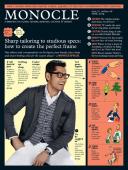
Issue 72
Sharp tailoring to studious specs: how to create the perfect frame. Our editors and correspondents on the buyers, new brands, select shops and smart-looking cities for the season ahead — a Monocle Special
In This Issue
Oops! No content was found.
Looks like we no longer have content for the page you're on. Perhaps try a search?
Return Home

